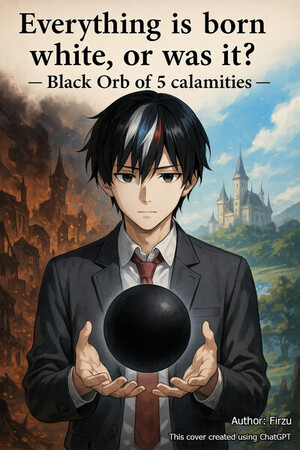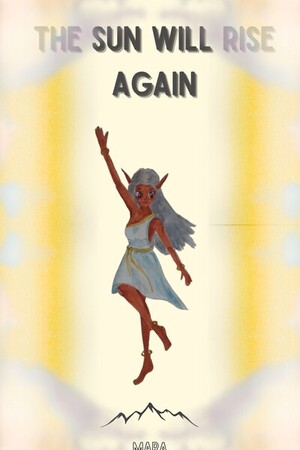Chapter 29:
Fenrir: The Shadow of Fenlareth
Everything is born white, or was it? ~Black Orb of 5 Calamities~
The forest did not appear on any map. Trees grew dense, moss hung like curtains, and small rivers wound beneath massive roots. There lived a matriarchal pack of wolves: females led, while males kept their distance—helpers, not kings. A female was only recognized as the head once she had given birth; the more offspring entrusted to her by the seasons, the stronger her position became.
But nature promised nothing to anyone. On one nameless dusk, the pack was slaughtered. There was no justice; only fangs, snares, and coincidence taking sides. When the ground drank its last blood, the mother still clung to life—stumbling, dragging her child’s cold body in her jaws, refusing to let go of what was already gone.
She collapsed upon a strange meadow—crowded with bones of deer, boars, even great birds, stacked as if hands had gathered them into an altar for something unseen. She lifted her snout—only to look upon the sky one last time.
Then a black sphere burst soundlessly above the field, like fireworks swallowed by the night. Its shards were not light but a heavy mist, sinking into every corpse—into her body as well. She had not yet died; breath still bound her to the earth. Because of that, the fog filled her more than the others. Cold settled into her bones, spreading—flesh hardened, bones thickened, shadows coated her fur. In a span of time she could not name, her body grew vast and powerful—unlike any wolf she had ever seen.
Yet new strength did not erase instinct. Amid the fresh darkness, she caught a scent: not blood, but presence. Five figures—unseen, yet pressing close like an abyss. Not friends, not prey. A threat—an eerie dread that made her back shiver, not from fear but because her body knew she was not worthy to draw near.
So she fled.
Shadows flowed like water beneath her paws. With a single leap she slipped from the shade of trees to the shadow of stone, from branch-dark to bush-dark. The new power felt like a second way of moving—leap—vanish—appear—repeat. At last she escaped the meadow and returned to the forest of her birth.
For years she lived alone. Cold nights taught her to howl not to call a pack, but to erase the silence. At times she tried approaching other wolf packs—none accepted her. They lowered their heads before they could grow angry; not out of respect, but because they could not look at her. Slowly, the forest acknowledged its king—an irony, for the king was a mother who had lost everything.
Seasons turned. Humans came, went, sometimes intruded. When intrusion passed the line, she slaughtered without compromise. Not from hatred—but because this was her domain. The forest demanded silence, and silence was not born from screams.
Until one day, the old dread returned—the same horror from that nameless dusk. From between the trees stepped a figure who cast no shadow on the ground. He carried a black sphere. With a light motion—like tossing a stone into a river—he threw the orb into the heart of the forest, then left without haste.
Relief came first: distance stretched between them. Yet where the orb landed, something called. Not words, not scent, only a pull. She approached, cautious as if nearing a trap. The orb lay still—dark like a bottomless pool. She stared too long, and anger swelled. Not anger at the orb—anger at everything: at that night, at the meadow, at the five shadowed figures, at the forest that left her alone.
She devoured the orb.
No taste—only cold piercing her bones, followed by searing heat from within. Her fur, once gray, turned black from tip to root. Her eyes bulged and changed: deep violet, dragging anyone who looked into them down into a bottomless pit.
She stood taller than ever. Beneath her paws, shadows blossomed again: black wolves crawling out from the dark, born from the long-suppressed sorrow in her howls. One, two, ten, a hundred—the pack she once led returned as shadows, obeying without reason but her voice.
From then on, the forest’s roads changed. No longer paths for hunters; no longer shortcuts for merchants. A curse dwelt among the trees. Any who walked too far were swallowed by darkness that craved not blood—but disappearance. Villages on the edges closed their paths; mothers warned their children not to stare too long at shadows; men spoke the name softly, like a prayer they hoped would go unanswered.
Fenrir.
So humans named the black giant who strode in silence beneath the trees, accompanied by a pack born of darkness. And so the forest gained its name: Fenlareth—the forest marked by a wolf who was once a mother, twice pulled into the night.
In a small city called Lunareth, the tale grew. Some said Fenrir preyed upon humans. Some swore they saw her pass their homes like a misplaced cloud. Some half-believed, half-laughed, calling her a ghost meant only to scare naughty children. But in every version, one thing remained: no one dared speak of Fenlareth without glancing back—just to make sure the shadow behind them was still their own.
And in the sky that once unleashed that black mist, in a place neither near nor far, five figures still waited—like stones enduring the patient erosion of water. Fenrir… remember. That was why she did not approach. That was why she struck down any who drew too close. That was how the legend was born.
The forest breathes.
The night watches.
Fenrir guards.




Please sign in to leave a comment.